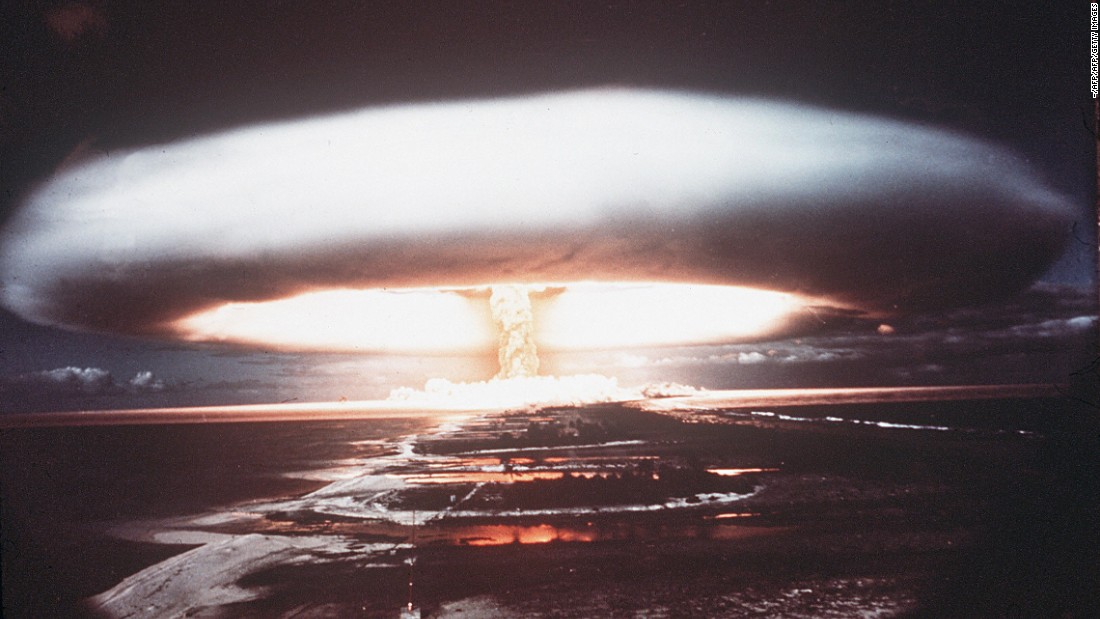Searches for "nuclear attack" on Google increase 0:48
(CNN Spanish) --
Vladimir Putin's rhetoric after the invasion of Ukraine has intensified to include direct references to Russia's vast nuclear arsenal: he put the country on its highest alert status and forced an assessment of the balance that prevents nuclear-armed nations destroy themselves and the world.
That has sparked concerns of a nuclear attack.
Russia is the country with the most nuclear warheads in the world.
That decision led to skyrocketing searches for the term "nuclear attack" over the weekend.
The issue sparked concern from people around the world, particularly in the UK, Ireland and the US.
US President Joe Biden said that people should not be afraid of nuclear war.
What to do in case of a nuclear attack?
The Internet is full of government recommendations on the subject.
Ready.gov, a national public service campaign of the US Department of Homeland Security, has advice in 13 languages on what to do if faced with a nuclear explosion, as well as links to similar information from the Centers for Disease Control and Disease Prevention (CDC) and the Environmental Protection Agency (EPA).
The recommendations mirror what was sent to residents of Guam, who are within the estimated range of North Korea's nuclear ballistic missiles.
advertising
The most frequent message: Take cover as fast as you can, preferably in a concrete or underground structure, and stay there until told to come out.
Suzet McKinney, a Harvard instructor who is an expert in public health preparedness and emergency response, says the average person can understand the protective benefits that brick buildings and basements can provide.
"The goal is to get as far away from the nuclear material as possible."
Why fears of a nuclear attack increased
The Russian invasion of Ukraine broke 30 years of relative peace in Europe after the end of the Cold War.
The battle for Ukraine is the first real fight in the new war for dominance between autocracy and democracy, which the president has long predicted.
Russia's nuclear weapons are part of its "deterrence" strategy.
Moscow took control of the arms of other former Soviet republics, including Ukraine and Belarus, in the 1990s.
Now Russia has invaded Ukraine, and Belarus, which is an ally of Moscow, plans to give up its non-nuclear status and could theoretically allow Russian forces to bring nuclear weapons to the country again.
A threat does have precedent.
CNN's Zachary Wolf spoke with Matthew Fuhrmann, who along with Todd Sechser wrote the 2017 book, "Nuclear Weapons and Coercive Diplomacy," which documented 19 instances of nuclear threats and coercive language in the post-World War II era.
These include Soviet leaders like Nikita Khrushchev, who told the then US ambassador in 1959: "The West seems to forget that a few Russian missiles could destroy all of Europe."
Russia's total nuclear arsenal is larger than that of the United States, with about 6,250 nuclear warheads in total, according to the Arms Control Association.
The United States has more than 5,500.
Most of those warheads in both countries are not deployed on missiles or bases.
According to an assessment by the Arms Control Association, in terms of deployed nuclear warheads, Russia has 1,458 warheads on 527 intercontinental ballistic missiles, submarine-launched missiles and bombers.
Meanwhile, the US has 1,389 warheads on 665 intercontinental ballistic missiles, submarine-launched missiles and bombers.
No other country known or believed to have nuclear weapons (the UK, France, Israel, Pakistan, India, China and North Korea) has anywhere near that number of nuclear warheads.
The nuclear situation in Europe and the US position
There are currently 13,400 nuclear weapons in the world, according to the UN.
And while achieving global nuclear disarmament has been one of the United Nations' oldest goals, dating back to 1946, there is still today "frustration at the slow pace of nuclear disarmament."
What experts say bothers Putin is that the US has around 100 nuclear weapons stored in Europe at NATO bases in Italy, Germany, Turkey, Belgium and the Netherlands.
He fears the United States could plant nuclear weapons in NATO countries further east, closer to Russia.
US weapons in Europe are believed not to be live, according to the Center for Arms Control and Non-Proliferation, but stored underground.
They would have to be transported on fighter planes for use.
The Biden administration is being very careful to support Ukraine without getting directly involved in the military fight.
And he has made it very clear that the United States has not changed its own nuclear threat level.
The United States also does not have a "no-first-mover" policy and allows by "sole authority" of the president the use of nuclear weapons, and most presidents have said the "sole purpose" would be nuclear deterrence.
The Biden administration is expected to complete its own broad Nuclear Posture Review, traditionally conducted by new presidents, this year.
The review sets out an administration's approach to nuclear weapons policy.
These reviews are often heavily classified.
As a presidential candidate, Biden suggested that he would pursue a "single-purpose" nuclear strategy, meaning that nuclear force can only be used to deter or retaliate against a nuclear attack against the United States and its allies.
With information from Sandee LaMotte, Zachary B. Wolf, Stephen Collinson, and Maeve Reston
nuke attack

